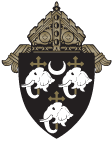From Gregorian chant to Christian rock, music of praise and worship crosses genres, cultures and centuries. Some believers find a bridge to the divine in listening to Handel’s “Messiah,” or the African-American spiritual “Go Tell It on the Mountain,” or Dan Schutte’s Scripturally-based “Here I Am, Lord.”
Or, for some, John Coltrane’s “A Love Supreme.”
If,as church musicians like to say, the person who sings prays twice, the jazz saxophonist offered several prayers when he composed and recorded “A Love Supreme” in a single session on Dec. 9, 1964. Specifically four prayers, as the 33-minute work is a four part suite: “Acknowledgement,”
“Resolution,” “Pursuance” and “Psalm.”Coltrane said the album, recorded 50 years ago here in New Jersey, in a studio in Englewood Cliffs, was “a humble offering to Him, an attempt to say ‘thank you
God.'”
The music is not specifically Catholic but it is spiritual in the most profound sense, said Ken Bossong, who will offer a presentation on “A Love Supreme” Feb. 20, 7:30-9 p.m., at Blessed Teresa Parish, Collingswood.
Coltrane, a student of world religions and cultures, clearly was informed by his Christian upbringing; each of his grandfathers was a preacher.“The message of this seminal work is ‘God is love.’ That is as fundamental as you can get,” said Bossong, who plans to offer a “guided tour” of the music with his presentation.
Bossong said he plans to give a fan’s non-technical presentation of the music, focusing on his own appreciation of the work and its cultural significance, as well as Coltrane’s life and ambitions. There will also be a discussion period.
Bossong pointed out that while Coltrane was usually reluctant to talk about his own music, preferring to let it speak for itself, he wrote the devotional poem and liner notes to “A Love Supreme” himself. The musician begins by quoting Jesus – “Yes it is true: ‘seek and ye shall find.'” Then he explains that in 1957 he experienced “by the grace of God, a spiritual awakening which was to lead me to a richer, fuller, more productive life.”
It is widely believed that Coltrane’s religious conversion gave him the strength to overcome his heroin and alcohol addictions.Most well known for turning the Rogers and Hammerstein tune “My Favorite
Things” into a jazz tour-de-force, Coltrane is a towering figure for fans of modern jazz, and his influence extended beyond jazz musicians.
Rock guitarists Duane Allman and Carlos Santana have cited him, as have bands from the Byrds to U2. The trappist monk Thomas Merton, author of “The Seven Storey Mountain,” was a fan, according to Timothy English, whose most recent book, “Popology,” examines the musical tastes of several influential political and religious figures.(Another fan worth mentioning is the insightful, bipolar – and fictional – C.I.A. operative Carrie Mathison portrayed by Claire Danes on the Showtime series “Homeland.” Coltrane’s “Newport ‘63” is on her bureau.)
Bossong describes Coltrane’s music as challenging but accessible and, ultimately, spiritually enriching. To that end, he especially wants to introduce “A Love Supreme” to those who have never heard it, including those who aren’t normally jazz fans. “One of the greatest and most influential albums ever recorded was also a prayer,” he said. “Everyone should have a chance to hear it properly presented.”
Written by Carl Peters for the January 17 Catholic Star Herald
If you go:
“John Coltrane’s ‘A Love Supreme’: Presentation and discussion on this musical masterpiece,” Thursday, Feb. 20, 7:30-9 p.m., McLaughlin Hall,
Blessed Teresa Parish, Lees and Atlantic Avenues, Collingswood.
